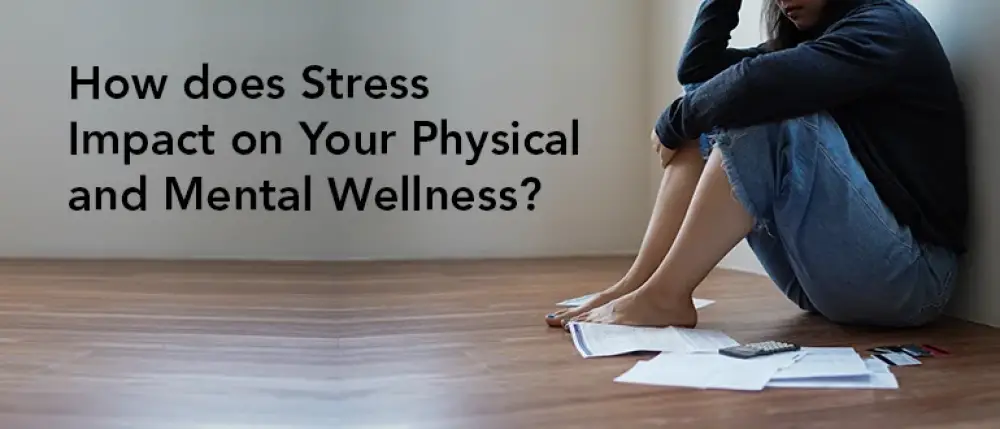Subscribe to get weekly insights
Always stay up to date with our newest articles sent direct to your inbox
Published on 24 Jul, 2024
Updated on 11 Jul, 2025
2237 Views
6 min Read

Written by Mudit Handa
favorite1Like
“Sometimes the most productive thing you can do is relax”- Mark Black.
Stress is body’s natural reaction to deal with a critical or challenging situation. which may be imaginative or real. When you are scared or feel threatened, your body induces a stress response to prevent any harm or injury. Due to this heart rate increases, blood pressure goes up, breathing quickens, and muscles stiffen as a reaction known as “fight or flight”. However, stress symptoms may vary person to person depending on the age, surroundings, nature, and attitude. Although it is considered as a positive reaction as it helps in tackle a difficult situation, the continued long-term effects of stress can have severe ill consequences on your physical and mental health. This article explains of how severe stress symptoms can adversely affect your physical and mental health.
It is important to understand and realise that you are under duress. To know the effects of stress on health, the symptoms need to be clarified as they can be vague and sometimes may mimic other medical conditions. When it comes to stress, the relation between physical and mental health cannot be overemphasised. It is deeply interdependent and is impacted significantly by stress.
Emotional symptoms include:
Physical Symptoms Include:
Cognitive Symptoms are:
Behavioural manifestations include:
Have you ever had butterflies in your stomach before an office presentation or facing an interview? As a kid, did you complain of headaches or stomach aches before going to school on an exam day? These are all signs of stress. But this can be called good stress as it helps in bringing a positive outcome. What we feel during a major natural calamity, terrorist attack or even during a family feud is acute stress, which has a major impact on health if continued for a long time. Stress's impact on health can be seen when it is chronic or life-altering-
It is seen that stress's impact on health can be far-fetched. It affects all the organ systems and may cause serious health hazards in future if not controlled at an earlier stage. Severe conditions may require immediate medical attention or hospitalisation. In such a situation monetary stress would be least expected. By investing in a health insurance plan you can remain stress-free in an emergency situation. Care Health Insurance not only provides financial back-up by covering hospitalisation and treatment expenses in case of any emergencies arising due to tertiary effects of chronic stress, like stroke, heart attack, ulcers, etc. but also ensures quality healthcare through its 21700 network healthcare providers.
Nowadays, physical and mental health go hand in hand. You are not ok if you are not mentally strong. As stress can quite easily control your mental health, chronic stress can trigger many psychiatric disorders like depression, bipolar disorders and post-traumatic stress disorder.
As these internal changes are uncontrollable, it may be prudent to go for a healthcare plan involving wellness and preventive measures with free health check-ups and physician consultations. It will help you to detect or consult your healthcare provider if you are constantly under stressful situations.
Now that you know how stress affects health and overall well-being, it is a practical approach to admit that it cannot be eliminated. It can only be controlled and reduced to a point where your health is not impacted. You can follow some tips or strategies for managing stress :
Also Read: Can Stress Cause Cancer?
The effects of stress in a short time may seem harmless, but in the long run, it affects your entire body and mind. The symptoms are very ordinary which we feel every day, some time or the other. You need to hence, understand the situation, your health conditions and your surroundings to decide on the stress management measures you can take, to prevent complicated and life-altering illnesses. In addition, you can also go for a comprehensive health insurance plan to cover any health-related issues and remain stress-free financially.
Disclaimer: The above information is for reference purposes only. Kindly consult your general physician for verified medical advice. The health insurance benefits are subject to policy terms and conditions. Refer to your policy documents for more information.
Thyroid : मामूली नहीं हैं महिलाओं में थायराइड होना, जानें इसके लक्षण और घरेलू उपचार Vipul Tiwary in Diseases
शुगर कंट्रोल कैसे करे? जानें, डायबिटीज में क्या खाना चाहिए Vipul Tiwary in Health & Wellness
हाई ब्लड प्रेशर को तुरंत कंट्रोल कैसे करें? देखें इसके उपाय Vipul Tiwary in Diseases
पैरों में दर्द किस कमी से होता है? जानें, इसके घरेलू इलाज Vipul Tiwary in Health Insurance Articles
Amino Acids: The Unsung Heroes of Your Mental Well-being Jagriti Chakraborty in Mental Health
Digital Detox for Mental Health: Urban Millennials' Guide to Stress Management Mudit Handa in Mental Health
10 Major Symptoms of Chronic Stress and Their Impact! Sejal Singhania in Health Insurance Articles
Burnout vs. Depression: How to Spot the Signs and Protect Your Health Leena Khowal in Diseases
Always stay up to date with our newest articles sent direct to your inbox
Loading...